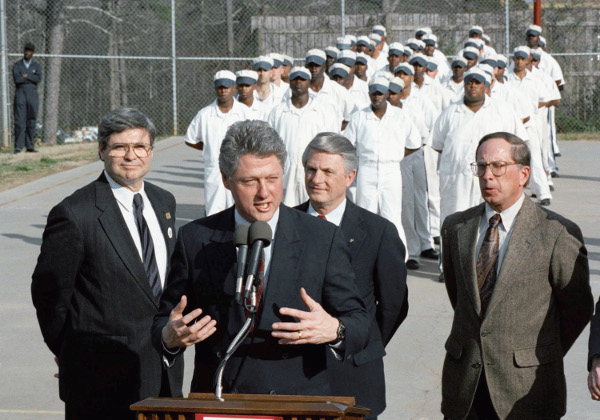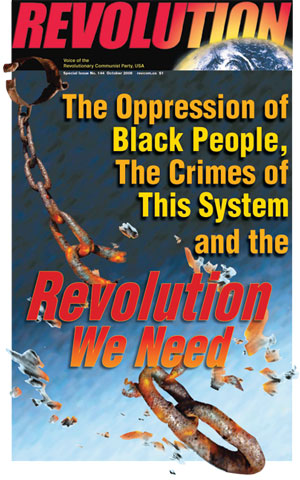Top Government Official Admitted: The “War on Drugs” IS a War on the People
April 11, 2016 | Revolution Newspaper | revcom.us
For decades and decades, millions of lives have been RUINED by the government’s “war on drugs.” Black and Latino people have especially been targeted. Tens of thousands have been imprisoned for years for even small amounts of marijuana. Millions have been hounded on the street, stopped and frisked, beaten and murdered by the police. Children have grown up without their fathers, young kids have grown up in juvenile detention.
Did this happen because the government was trying to “get drugs off the street”?
No. And John Ehrlichman, a top government official under President Nixon in 1969, admitted this in a 1994 interview on the “war on drugs”:
The Nixon campaign in 1968, and the Nixon White House after that, had two enemies: the antiwar left and black people. You understand what I'm saying? We knew we couldn't make it illegal to be either against the war or black, but by getting the public to associate the hippies with marijuana and blacks with heroin, and then criminalizing both heavily, we could disrupt those communities. We could arrest their leaders, raid their homes, break up their meetings, and vilify them night after night on the evening news. Did we know we were lying about the drugs? Of course we did.1
Decades of a War on the People
When the “war on drugs” was launched almost 50 years ago, the U.S. ruling class was facing a huge legitimacy crisis. The whole system was under siege from rebellions and revolutions—in the U.S. and around the world.
The civil rights movement in the South had given way to a nationwide Black liberation movement and rebellions against racism and police brutality had erupted in over 100 U.S. cities. There were huge protests against the U.S. war in Vietnam; millions of people were not only against the war but taking up struggles against racism and police brutality, the fight for women’s liberation, and gay rights. Millions of people, especially the youth, saw themselves as revolutionaries, many looking to Mao’s China (which at that time was a genuinely socialist country). The “war on drugs” was part of the system’s counteroffensive in the face of the huge challenge this presented to the ruling class. As Ehrlichman put it: “We knew we couldn't make it illegal to be either against the war or black, but by getting the public to associate the hippies with marijuana and blacks with heroin, and then criminalizing both heavily, we could disrupt those communities.”

During his presidency, Bill Clinton oversaw an explosion of prison-building while cutting welfare and other services for poor people. Here, he poses in front of a chain gang of Black
prisoners at Stone Mountain, Georgia. Meanwhile, Hillary Clinton denounced Black youths as “super-predators” who had to be “brought to heel.” (AP photo)
For generations now, the “war on drugs” has meant cops kicking down doors; people locked up for small amounts of marijuana; harsh sentencing laws; occupation armies of police in Black and Latino communities, harassing, beating, killing people. It has meant Black and Latino youths being criminalized, demonized, and treated as elements in society that need to be feared and controlled, to be incarcerated and subjected to the torture of solitary confinement because they are the “worst of the worst.”
And EVERY U.S. president since, Republican and Democrat, has continued this war on the people.
Under Ronald Reagan in the 1980s, racist sentencing procedures were introduced, such as the law punishing possession of crack cocaine (more common in poor Black communities) 100 times more harshly than powder cocaine (more popular among the white middle class.) “Mandatory minimums” for drug crimes meant that people were getting life sentences for possessing small amounts of drugs.
Bill Clinton oversaw an explosion of prison-building while cutting welfare and other services for poor people. He posed for photos in front of a Black chain gang, while Hillary Clinton denounced Black youths as “super-predators” who had to be “brought to heel.” Between 1980 and 1997 (near the end of Clinton’s term), the number of people in U.S. prisons for nonviolent drug offenses went from 50,000 to over 400,000—an 800 percent increase. Nearly 60 percent of these were Black people, even though they constituted only about 15 percent of drug users.
Then we got Obama, who made a big deal about commuting the sentences of 248 nonviolent drug offenders. But this is just a fucking insult to the hundreds of thousands living behind bars because they’re victims of the racist and unjust “war on drugs.” In fact, Obama has done nothing to really put an end to the whole way the “war on drugs” especially targets Black and Latino people.
Since the 1960s, there have been big changes in the global economy and the U.S. capitalist system. There are now millions of Black and Latino people this system cannot profitably exploit, that this system has no future for—that this system fears as a potentially volatile and rebellious force. The “war on drugs” is a big part of the system’s attempt to control and repress this section of society.
The “war on drugs” always was and continues to be a war on the people. This underscores the totally illegitimate nature of this system and that it needs to be overthrown as soon as possible.
1. “Legalize It All” by Dan Baum, Harper’s, April 2016. (Some people question the authenticity of this quote because Ehrlichman is no longer alive to verify it. However, in addition to the fact that Dan Baum is a respected author and journalist, it should be noted that the Ehrlichman quote is in line with other existing evidence, such as the quote from the diary of another top Nixon aide, H.R. Haldeman, that “President [Nixon] emphasized that you have to face the fact that the whole problem is really the blacks. The key is to devise a system that recognizes this, while not appearing to.”) [back]
Volunteers Needed... for revcom.us and Revolution
If you like this article, subscribe, donate to and sustain Revolution newspaper.








